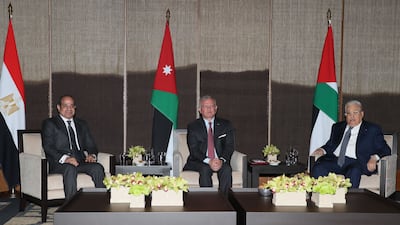Live updates: Follow the latest news on Israel-Gaza
King Abdullah II of Jordan discussed ways to prevent the expulsion of Gazans with the leaders of Egypt and the Palestinian Authority, official media reported.
The discussions in the Jordanian city of Aqaba on Wednesday came as the US intensified its diplomatic drive to contain the Israel-Hamas conflict that has raged for three months.
The king met Egypt's President Abdel Fattah El Sisi and Palestinian President Mahmoud Abbas, as US Secretary of State Antony Blinken was winding up a mission in the region after urging Israel to limit civilian casualties.
The three leaders “affirmed … their stand against any Israeli plans to expel the Palestinians”, the Jordanian state news agency Petra reported.
“The leaders warned [Israel] against any attempt to reoccupy Gaza, affirming the need to empower Gaza's inhabitants to return to their homes,” the agency said.
Mr Abbas hosted Mr Blinken in Ramallah in the occupied West Bank on Tuesday, before Mr Blinken travelled to Bahrain.
Mr Abbas then joined Egypt's President El Sisi in Jordan, where they were received by King Abdullah at the airport in Aqaba.
The three leaders discussed “the dangerous developments in Gaza and the situation in the West Bank,” Jordan's royal palace said.
They are united in pushing for an immediate ceasefire in Gaza and to “ensure the uninterrupted delivery of humanitarian aid” to the area, the palace said.
In Tel Aviv on Tuesday, Mr Blinken pushed Israel to consider humanitarian needs.
Diplomats and officials in the region say Israel has been paying little heed to Mr Blinken and other US officials
This is despite Washington agreeing with its Arab allies that the high civilian toll is unacceptable and that the war should not result in the permanent displacement of Palestinians from Gaza.
“Israel is acting like a wild horse, and the Arab leaders don't like that,” one of the diplomats said. “But they realise that the US is the only force that is somewhat restraining it.”
Although the war appears to have revived the international quest for a two-state solution, a main demand for the three leaders meeting in Aqaba, they realise that “it's a long shot” as long as Prime Minister Benjamin Netanyahu is in office, said one of the sources, who is in Cairo.
The source said that the three men will discuss in Aqaba “day after” post-war scenario for Gaza floated by Mr Blinken, although Mr Abbas has been displeased that the Palestinian Authority has been largely left out of this scenario.
Mr Abbas objects to the deployment of a multinational force in Gaza for a transitional period, a proposal backed by Washington, fearing that it would undermine any role for the Palestinian Authority, the source said.
The Israeli military, which says that Hamas members are hiding among civilians, expects its Gaza campaign to continue throughout 2024 as the focus of its operations shifts from the north to the centre and south of the Strip.
The operation started a day after Hamas and other militant groups supported by Iran, attacked southern Israel, killing about 1,200 Israelis on October 7.
The Israeli offensive has killed more than 23,300 people in Gaza, Palestinian officials say.
Mr Blinken said Israel had agreed to allow a UN mission into northern Gaza to study how the area's residents can return.
About 1.9 million of Gaza's 2.3 million people have been displaced from their homes within the enclave. Many of those displaced were from Gaza city and surrounding areas in the north of the territory, which endured the heaviest Israeli bombing in the initial stages of the war.
Mr Blinken described the UN plan as a potential “assessment mission”. But he said that fighting an enemy who hides among civilians was “incredibly challenging”.
Israel has shifted its military focus to Khan Younis, in southern Gaza.
Hamza Hendawi reported from Cairo

